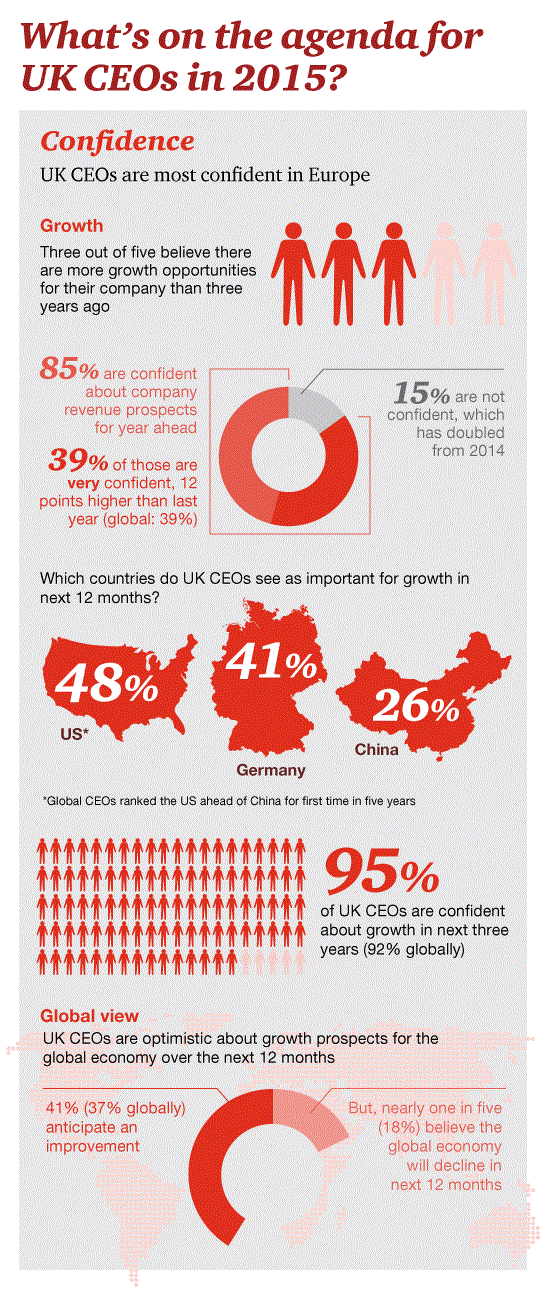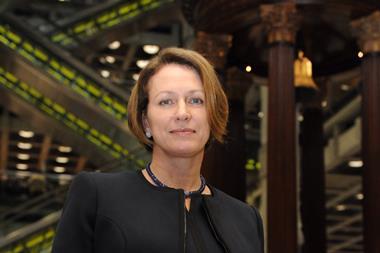Chief executives also highlighted the US, Germany and China as the most important countries for growth, but say they are concerned by a shortage of talent

KEY FINDINGS
- Eighty-five per cent of UK business leaders are confident about their company’s prospects for the year ahead
- Across Europe, only more Spanish chief executives (63%) are very confident about long-term growth
- Russian chief executives have gone from the most optimistic to least optimistic in the space of 12 months
- Forty-eight percent of chief executives said the US, Germany (41%) and China (26%) were the most important countries for growth for UK businesses
- The biggest problem for leaders is access to skills, with 84% citing this as a challenge (up 64% on 2014’s survey results)
- Advancement in technology is a major worry, with 59% citing the speed of technological change as a key concern (up from 55% on last year’s survey)
- A further 62% are concerned changes in technology will disrupt the core provision of their products or services
UK chief executives are the most confident in Europe, according to PwC’s 18th annual Global CEO Survey. Three out of five (61%) UK chief executives believe there are more growth opportunities for their company today than three years ago – more than any of their European peers.
PwC surveyed 1,322 chief executives in 77 countries in the last quarter of 2014. By region, 459 interviews were conducted in Asia-Pacific, 455 in Europe, 147 in North America, 167 in Latin America, 49 in Africa and 45 in the Middle East.
The survey found that 85% of UK business leaders are confident about their company’s prospects for the year ahead, slightly down from 93% 12 months ago. However, after the bullishness of 2014, this year’s survey reveals a greater divergence in optimism levels among UK chief executives. Just under 40% are “very confident” about their company’s fortunes for the year, up from 27% in 2014. Yet the number of chief executives not confident about the next 12 months has more than doubled to 15%, from 7% in 2014.
Views about the short term may be mixed, but 95% of UK business leaders are confident (with 52% very confident) about growth prospects for their own company in the next three years. This is above the 92% global confidence level and, across Europe, only more Spanish chief executives (63%) are very confident about long-term growth. Russian chief executives have gone from the most optimistic to least optimistic in the space of 12 months. Confidence is down in other oil-producing nations such as the Middle East, Nigeria and Venezuela.
UK chief executives are among the most upbeat about the growth prospects for the global economy in the next 12 months, with 41% anticipating an improvement. Although this is down from 61% last year, it is still above the global average (37%) and, in Europe, only Nordic chief executives are more optimistic. Notably, although, nearly one-in-five (18%) of UK chief executives believe the global economy will decline in the year ahead, whereas none held this view last year.
When asked about the most important countries for UK company growth in the coming year, 48% of UK chief executives cited the US, Germany (41%) and China (26%). Global chief executives ranked the US ahead of China as an important market for growth for the first time in five years.
The importance of overseas markets to the UK is reflected in bold strategies for growth. Thirty-eight percent of UK leaders plan to complete a cross-border M&A transaction this year – almost double the number planning to do a domestic deal (20%) - and well above the global average of 27%.
The skills gap
However, the biggest problem for UK leaders is access to skills. The number concerned about the availability of key skills has risen considerably, from 64% in 2014 to 84% this year. This is a greater worry for UK chief executives than their global peers (73%), and significantly higher than for those in France (37%), Germany (54%) and Spain (53%).
UK chief executives recognise that they cannot bridge the talent gap alone. Two-thirds (67%) believe that a priority of government should be to create a skilled and adaptable workforce, up from 60% last year. Only 26% believe the government has achieved this.
Ian Powell, chairman and senior partner of PwC UK, commented: “Last year we saw a sharp rise in confidence as the UK economy appeared to turn a corner. Although confidence remains high, there is no room for complacency.
“A keen focus for UK chief executives is how the UK develops the right skills to compete globally. Our survey again highlights the pressing need for the government, business and education sectors to work together to enable the UK to prosper in the long-term. There has been good progress with apprenticeship schemes, but we need to build on this success to ensure that skills and opportunities are matched.”
Digital focus
This year’s survey highlights the effect of the digital revolution on business. Fifty-nine percent of UK chief executives are concerned by the speed of technological change, up from 55% last year, and one in three (33%) believe that a potential competitor to their business is emerging or could emerge from the technology industry.
Sixty-two percent of UK chief executives are concerned that changes in technology will disrupt the core provision of their products or services, almost four times the number of German chief executives concerned (16%). Changes in customer behaviour are also a worry, with 72% of UK chief executives seeing this as disruptive, compared to 41% of German chief executives.
UK business leaders recognise that they need to lead by example when it comes to embracing digital. Almost nine out of 10 (89%) believe that the chief executives championing the use of digital technologies is the most important factor in helping their organisation get the most out of digital investments.
Ian Powell concluded: “The potential for the digital era to disrupt markets and the way companies do business is ever more apparent, and UK chief executives appear to be acutely aware of the risks and the potential rewards. Our business leaders know they need to embrace technology at the core of their organisation. Nine out of 10 UK chief executives believe they need to have a clear vision of how technologies can help achieve competitive advantage to become digitally fit for the future.”




















No comments yet